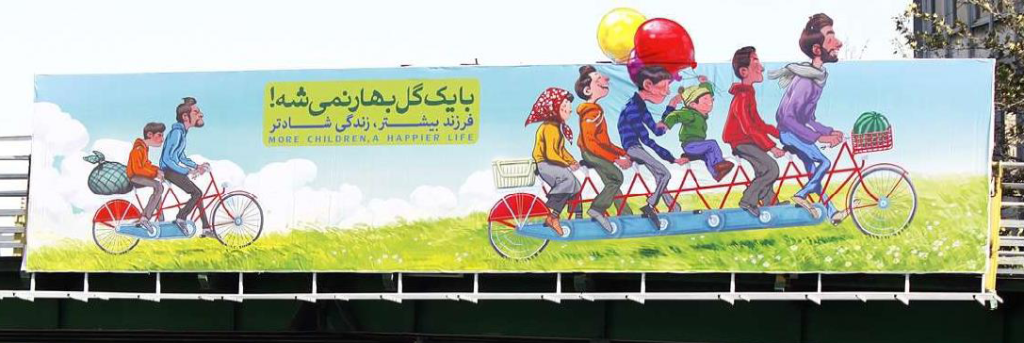
Amnesty International last week attacked the Islamic Republic for pushing legislation it said would reduce Iranian women to mere “baby-making machines.”
The group said the decision made two years ago by Supreme Leader Ali Khamenei to end Iran’s globally-praised birth control system has gone beyond mere verbal urging that families have more children. The effort now amounts to reducing women to even lower status with no real role in society beyond repeated motherhood.
Women in Iran could face significant restrictions on their use of contraceptives and be further excluded from the labor market unless they have had a child if two proposed laws are approved, says the new report by Amnesty International, published last week.
“You Shall Procreate: Attacks on Women’s Sexual and Reproductive Rights in Iran” details the lengths the Iranian authorities are going to in order to encourage repeated childbearing.
“The proposed laws will entrench discriminatory practices and set the rights of women and girls in Iran back by decades. The authorities are promoting a dangerous culture in which women are stripped of key rights and viewed as baby-making machines rather than human beings with fundamental rights to make choices about their own bodies and lives,” said Hassiba Hadj Sahraoui, deputy director for the Middle East and North Africa at Amnesty International.
“The bills reinforce discriminatory stereotypes of women, and mark an unprecedented move by the state to interfere in people’s personal lives. In their zealous quest to project an image of military might and geopolitical strength by attempting to increase birth rates, Iran’s authorities are trampling all over the fundamental rights of women—even the marital bed is not out of bounds,” she said.
The latest bill before the Majlis (Bill #315) is titled the Comprehensive Population and Exaltation of Family Bill. It is scheduled for debate in the Majlis next month.
AI says it would “further entrench gender-based discrimination, particularly against women who choose not to or are unable to marry or have children.” The bill instructs all private and public entities when hiring to give first preference to men with children, then married men without children and then married women with children. Women without children would go to the back of hiring line.
AI said the bill also discourages police and judicial intervention in family disputes, thus opening women to increased risks of domestic violence. “The Iranian authorities must recognize that introducing such legislation could have devastating consequences for women trapped in abusive relationships,” said Sahraoui.
And the bill would make divorces harder for women to obtain. Under Iran’s existing civil code, wives seeking a divorce already need to prove they are facing “unbearable hardship,” while men can divorce without giving any reason. Bill #315 would incentivize judges to rule against divorce by offering them bonuses based on how many of their cases result in marital reconciliation.
The other piece of legislation, “The Bill to Increase Fertility Rates and Prevent Population Decline” (Bill #446), outlaws voluntary sterilization, which is believed to be the second most common method of contraception in Iran, and blocks access to information about contraception, denying women the opportunity to make informed decisions about having children.
Coupled with the elimination two years ago of state funding for Iran’s family planning program, this would likely result in greater numbers of unwanted pregnancies, forcing more women to seek illegal and unsafe abortions, AI said.
Lack of access to condoms, which were previously dispensed through urban clinics and rural health houses funded by the government’s now-defunct Family and Population Planning Program, could also lead to a rise in sexually transmitted diseases.
Bill #446 was passed by the Majlis with an overwhelming majority in August 2014. The Council of Guardians, which needs to approve a bill before it can become law, found several problems and returned it to the Majlis for amendment.
Sahraoui said, “The bills send a message that women are good for nothing more than being obedient housewives and creating babies and suggests they do not have the right to work or pursue a career until they have fulfilled that primary role and duty.”
She said, “The Iranian authorities are resorting to the law to try to curb women’s advances in the country and seek to confine them to the roles of mothers and wives. Instead of adding to the catalogue of discriminations Iranian women face, the authorities must recognize that women are human beings with fundamental rights, and rescind such discriminatory laws.”
Sahraoui concluded, “The authorities already seek to control what Iranian women wear, where they work and what they study. Now they are interfering with their private lives by seeking to control their bodies and tell them how many children to have. Both proposed bills must be scrapped and funding for quality family planning services must be restored. Women must be able to live in dignity without such intrusive infringements on their fundamental rights and freedoms.”